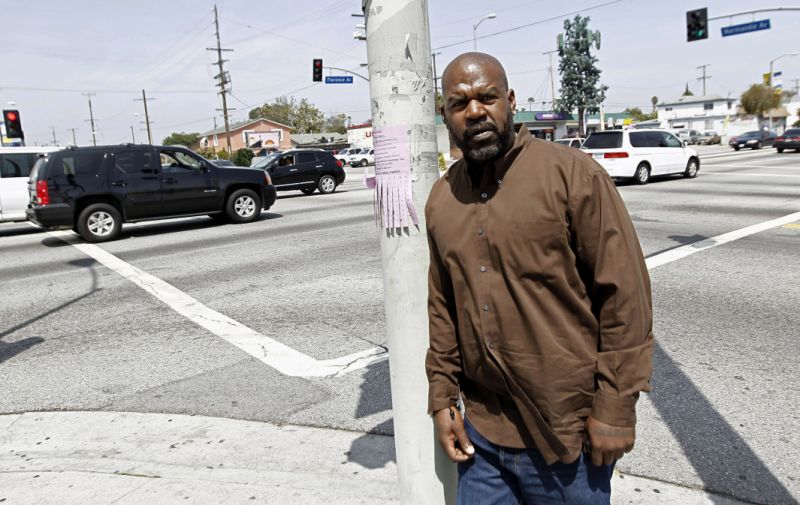My Lunch With KeeKee Watson, Played Infamous Role On Florence and Normandie
/On April 29, 1992, I had a big-time hankering for my favorite hot dog. Just as I was about to roll out to Art’s Famous Chili Dogs, at Florence and Normandie, my cousin Greg called. “I’m going to Art’s,” I told him. Greg yelled at me: “Do not go to Art’s! Turn on the TV.”
I did, and what I saw was Reginald Denny a brick’s throw from Art’s, getting stomped. As I watched, one of his attackers, Henry Keith “KeeKee” Watson, stood, almost casually, on Denny’s neck.
Twenty-five years later, I’m at a pizzeria with KeeKee, now 52, talking about the riots. He can be an imposing man; big, wide, capable of a frightening sneer. But on this day, he’s charming. The two female servers smile when he raves about his three-cheese pizza. His glowing review of butterscotch pudding could not be printed here. (The servers ask him to write it on a comment card.)
Watson remembers the mayhem of 1992 as cathartic — a furious release — and yet it had no lasting impact on his neighborhood, three blocks from the Florence and Normandie flashpoint. What fed the fury, he will tell you, only gets worse.
“Twenty-something years ago, they was beating guys like Rodney. Now they’re shootin’,” Watson said. In 2016, he witnessed a police shooting in an alley near 107th and Western Avenue. “Half the time they ain’t traffic stops. They are assassinations.”
Twenty-something years ago, they was beating guys like Rodney. Now they’re shootin’.
Keith “KeeKee” Watson
Watson acknowledges his pivotal involvement in the ’92 riots, but he puts the overall onus on the police.
“The LAPD is 99% to blame. When I first saw the Rodney King beating, we were kind of excited because it was like, finally, this was caught on tape.
“Just about any black man in Watts, Green Meadows, any South Central neighborhood — getting your ass kicked by the police was not news. It was a matter of fact. We thought finally, finally, finally they caught them on video.”
Then the verdict came in.
“I was shocked. I was in disbelief. I was pissed off,” Watson said. “On 69th Street everyone was upset. It was like validation that it was OK for the LAPD to beat black men. The turmoil was kicking up. Minute by minute it was getting turned up.”
In court a year later, Watson would escape felony conviction; he was found guilty of misdemeanor assault and released for time already served. In his defense, his lawyer said, he got caught up in “crowd contagion.”
This is the way KeeKee explains it now: “It’s like if you told me you had an extra Garth Brooks ticket, I’d say, ‘Brother Mike, I’m gonna have to pass on that.’ But if you were able to convince me to go, hell, 30, 40 minutes into the concert, I’d be do-si-doing. That’s what happened at Florence and Normandie.”
Michael Krikorian, author of the crime novel “Southside,” was a freelance writer in 1992. His Tweeter acount is @makmak47 . Henry Keith Watson apologized to Reginald Denny in court and on television in 1993. He has been a limousine driver since 1996.


